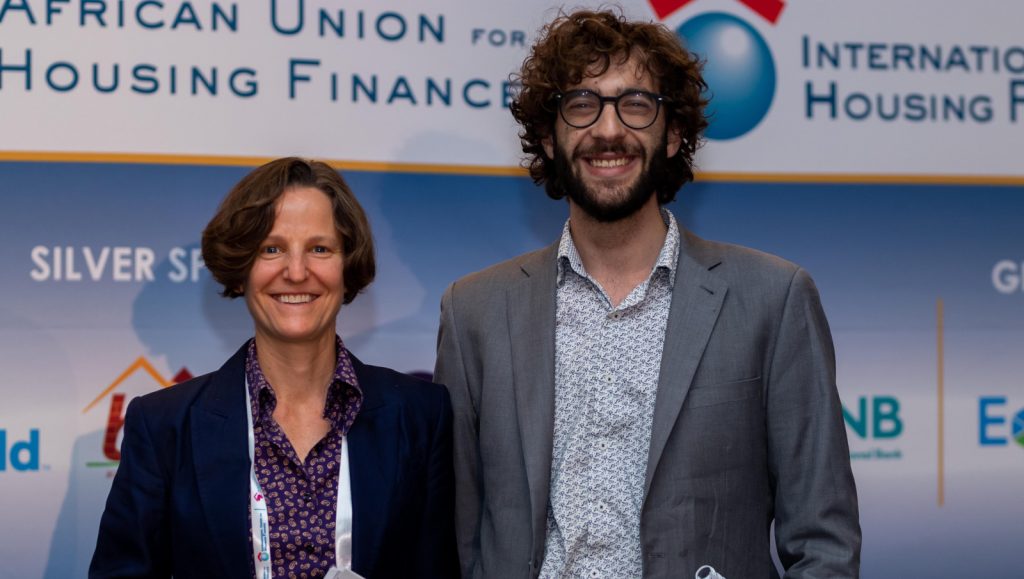LG’s 100-Inch QNED evo AI TV Redefines Big-Screen Viewing in South Africa In a bold leap forward for home entertainment, LG Electronics South Africa…
Trio piloting SA’s first blockchain-based property register in Khayelitsha

The Centre for Affordable Housing Finance in Africa (CAHF), research consultancy 71point4 and Seso Global have partnered to develop South Africa’s first blockchain-based property register.
CAHF said in a statement yesterday that the pilot study area consists of about 1000 properties located in four sites in Makhaza, Khayelitsha.
Daniel Bloch (pictured above, right with 71point4 founder Illana Melzer), the CEO of blockchain property registry company Seso Global pointed out that this is the first working example of a blockchain-based property registry in the country.
The company’s platform creates an immutable record of who owns which house. In addition, it also facilitates and records transactions such as sales and transfers out of deceased estates and integrates with third parties who facilitate transactions, including mortgage lenders.
The blockchain-based property register pilot consists of about 1000 properties in Khayelitsha
“For the time being, property owners will record these transactions at the Transaction Support Centre, a walk-in housing advice office created by CAHF and 71point4 located in the area.
“But over time, we will record transactions through the Seso app,” pointed out Bloch.
The blockchain solution allows the data to be stored in a decentralised, secure database that can be updated without any loss of historic data. This means there is a secure, back-to-back record of all transactions that is completely tamper-poof.
CAHF said the idea is to eventually integrate this record into the deeds registry when other impediments to transfer have been removed.
CAHF CEO Kecia Rust said the government has built over three million RDP houses since 1994, however, CAHF’s analysis of deeds office data indicates that only 1.9-million of these properties have been registered.
The centre added that the Department of Human Settlements, Water and Sanitation estimates that the title deed backlog for RDP properties built prior to 2014 currently stands at 511 752.
These properties, it said, were given to beneficiaries but no title deeds were registered and handed over. At the same time, there is a backlog of 351 470 title deeds on newer properties.
CAHF explained that registering these properties long after they were built and handed over to subsidy beneficiaries is an administratively complex task.
This, as in some cases, original subsidy beneficiaries are no longer living in the properties. Some beneficiaries might have since died, some might have tenants in their properties while others have sold their houses informally.
The founder and lead consultant of 71point4, Illana Melzer, said to create a register of property owners, the firm first had to go door to door to discover who lives in each property and to establish how they came to be there.
“We hired a team of 17 enumerators and trained them to collect information and capture supporting documents.
“Thankfully we can leverage smart phone to collect the data, but it still requires a significant effort. It took us two months to cover these areas,” added Melzer.
‘Significant benefits’
CAHF says properties in the area sell for over R200 000 informally, but pointed out that these would sell for more if they were listed on a trusted registry and were bankable. This, the non-profit added, would enable buyers to obtain mortgage finance.
The think tank also pointed out that there are “significant benefits” to the City of Cape Town of being able to access an accurate and up-to-date record of property ownership.
Without it, the city cannot collect revenue from households in the area who are not indigent nor can city departments facilitate building plan approvals.
Melzer said the three organisations hopes that those beneficiaries in the pilot areas who are still living on the properties can be registered in the deeds registry within a few months.
She added that the firm is working closely with the City of Cape Town to facilitate that.
“Where the beneficiary no longer lives in the property, we are in the process of tracing the beneficiary to confirm information we have gathered on who owns the property.
“We will also be working closely with the city on a resolution process where ownership is disputed,” she added.
She said it will take some time before all the required information has been collected and validated. It will also take time for validated properties to be registered on the deeds registry.
In the meantime, the firm will enable property owners and occupants to keep those records up to date.
CAHF, Seso Global and 71point4 have a working agreement to extend this pilot into other areas and use cases.
“We are very pleased with the pilot results. We think the solution we have developed is scalable and replicable,” said Bloch.
Featured image: 71point4 founder and lead consultant Illana Melzer and Seso Global CEO Daniel Bloch (Supplied)

